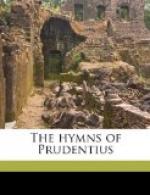51 The practice of praying on bended knees is
frequently referred to
in early Christian writers.
Cf. Clem., 1 Ad. Cor. cc. xlviii.: “Let
us fall down before
the Lord,” and Shepherd of Hermas, vis. 1. i.:
“After I had crossed
that river I came unto the banks and there
knelt down and began
to pray.” Dressel quotes from Juvencus (iv.
648), a Spanish poet
and Christian contemporary of Prudentius,
genibus nixi regem
dominumque salutant, “on bended knees they
make obeisance unto
their King and Lord.”
63 The Jordan is a poetical figure for baptism, suggested doubtless by the baptism of our Lord in that river. Cf. vii. 73-75.
67 Cf. Milton, Paradise Regained,
i. 293: “So spake our Morning
Star, then in his rise.”
The figure is suggested by Rev. xxii. 16:
“I am ... the
bright, the morning star.”
105 The conception of God as speculator
may be paralleled by a
passage in the epistle
of Polycarp ad Philipp. iv., where God is
described as the Arch-critic
(panta momoschopeitai) and subsequently
(vii.) as ton pantepopten
theon, “the All-witnessing God.”
The
last verse contains
a distinct echo of the closing words of the
fourth chapter of Polycarp:
“None of the reasonings or thoughts,
nor any of the hidden
things of the heart escape His notice.”
III
2 Word-begot. The original verbigena,
on the analogy of such
words (cf. terrigena,
Martigena, etc.), can only mean “begotten
of the Word.”
It is evident, therefore, the “Word” in
this connection
is not the Johannine
Logos or Second Person in the Trinity.
Prudentius cannot be
guilty of the error which he expressly
condemns (Apoth.
249) as perquam ridiculum and regard the
Logos as begetting Himself.
Consequently, both in this passage and
in xi. 18 (verbo
editus) the “Word” must be taken as
approximating
rather to the Alexandrian
conception of the Logos as the Divine
Reason. In this
way Christ is expressly described as the offspring
of the Intellectus
Dei, the immanent Intelligence of the Deity.
If this conception is
considered to be beyond Prudentius, we can only
suppose that both here
and in xi. 18, his language is theologically
loose. Some excuse
may be offered for this on the ground that the
Latin language is ill-adapted
for expressing metaphysical truths.
The late Bishop Westcott
remarked on the inadequacy of the Latin
original of “the
Word was made flesh” (verbum caro factum est),
both substantive and
verb falling short of the richness of their
Greek equivalents. (Vid.
also note on iv. 15.)
11 Cf. Ambrose, Hymn vii.:—




